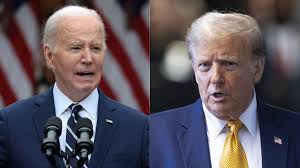The recent agreement between President Joe Biden and former President Donald J. Trump to move forward with two presidential debates — while sidelining the Commission on Presidential Debates — signals a potentially fatal blow to an institution that has long been a central player in presidential politics. This development marks a significant shift in how presidential debates are managed and raises questions about the future of this longstanding tradition.
The Historic Role of the Commission on Presidential Debates
Origins and Purpose
The Commission on Presidential Debates (CPD) was established in 1987 with the goal of organizing and producing debates for the United States presidential and vice-presidential candidates. For decades, the CPD has been regarded as the authoritative body responsible for ensuring that debates are conducted in a fair, impartial, and orderly manner.
Challenges Over the Years
While the CPD has managed numerous successful debates, it has not been without its challenges. Criticisms have ranged from allegations of bias to logistical difficulties. However, the commission’s ability to adapt and manage these issues has maintained its relevance until recent years.
The Decline of the CPD: A Decade in the Making
Early Signs of Trouble
The roots of the CPD’s decline can be traced back at least a decade. Increasing political polarization and changing media landscapes began to erode the perceived neutrality and authority of the commission. Both major political parties started expressing dissatisfaction with the CPD’s decisions and formats.
The 2020 Debates: A Turning Point
The 2020 presidential debates highlighted significant cracks in the CPD’s armor. The first debate between Trump and Biden was marked by chaos, with Trump frequently interrupting Biden and moderator Chris Wallace struggling to maintain control. Wallace, a seasoned journalist, described the experience as unprecedented in his career.
Impact of the Pandemic
The COVID-19 pandemic further complicated the CPD’s role. After Trump was diagnosed with COVID-19 days before the second scheduled debate, the CPD proposed a virtual format to ensure safety. Trump refused, leading to the cancellation of the second debate. The third debate saw the introduction of a mute button to manage interruptions, a measure that underscored the difficulty in maintaining decorum.
The Biden-Trump Agreement: A New Era for Presidential Debates
Direct Negotiations
The agreement between Biden and Trump to proceed with debates without the CPD marks a new chapter in presidential debates. This decision reflects a loss of faith in the CPD’s ability to manage debates effectively and impartially. It also signals a move towards more direct negotiations between candidates and their campaigns.
Implications for the CPD
This development raises serious questions about the future of the CPD. If candidates continue to bypass the commission, its role as the primary organizer of presidential debates could be rendered obsolete. The CPD’s inability to adapt to new political realities and maintain its authority has brought it to this critical juncture.
The Future of Presidential Debates
Potential New Formats
With the CPD sidelined, future presidential debates may see new formats and organizing bodies. Networks, independent organizations, or even direct negotiations between campaigns could shape the structure and rules of debates. This shift could lead to a more dynamic and flexible approach, but also risks further politicization.
Ensuring Fairness and Order
A key challenge moving forward will be ensuring that debates remain fair and orderly. Without a central organizing body like the CPD, there is a risk that debates could become even more chaotic and contentious. Establishing clear rules and ensuring that moderators have the authority to enforce them will be crucial.
Public Trust and Engagement
Maintaining public trust in the debate process is essential. The CPD’s perceived impartiality helped lend credibility to the debates. As new formats emerge, transparency in how debates are organized and conducted will be vital to maintaining voter confidence and engagement.
The agreement between President Biden and Donald J. Trump to move ahead with presidential debates without the CPD marks a significant turning point in the history of American presidential politics. The decline of the Commission on Presidential Debates reflects broader trends of political polarization and changing media dynamics. As we look to the future, the challenge will be to create new formats that ensure fairness, order, and public trust in one of the most critical components of the democratic process.




